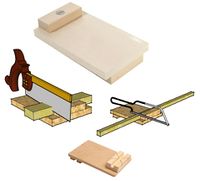Bench Hook: Difference between revisions
From DT Online
Using a Bench Hook |
m Improved Junior Hacksaw link |
||
| Line 4: | Line 4: | ||
They usually rely on hand pressure only but larger Bench Hooks can be held in a '''wood [[vice]]''' to secure them as they are used with a '''[[Tenon saw]]''' for example. | They usually rely on hand pressure only but larger Bench Hooks can be held in a '''wood [[vice]]''' to secure them as they are used with a '''[[Tenon saw]]''' for example. | ||
Small Bench Hooks can be used for sawing thin strips of softwood with a ''' | Small Bench Hooks can be used for sawing thin strips of softwood with a '''[[Hacksaw|Junior Hacksaw]]'''. | ||
Bench Hooks may have sawing guides to aid cutting [http://en.wikipedia.org/wiki/Miter_joint '''mitres'''] for example, and some smaller ones have various clamping devices added to secure the wooden strips. | Bench Hooks may have sawing guides to aid cutting [http://en.wikipedia.org/wiki/Miter_joint '''mitres'''] for example, and some smaller ones have various clamping devices added to secure the wooden strips. | ||
They are usually made of [http://en.wikipedia.org/wiki/Beech '''Beech''']. | They are usually made of [http://en.wikipedia.org/wiki/Beech '''Beech''']. | ||
Revision as of 10:17, 23 October 2014

Bench Hooks are held against the front edge of a bench or table to support work whilst it is being sawn - and to protect the bench or table!
They usually rely on hand pressure only but larger Bench Hooks can be held in a wood vice to secure them as they are used with a Tenon saw for example.
Small Bench Hooks can be used for sawing thin strips of softwood with a Junior Hacksaw.
Bench Hooks may have sawing guides to aid cutting mitres for example, and some smaller ones have various clamping devices added to secure the wooden strips.
They are usually made of Beech.